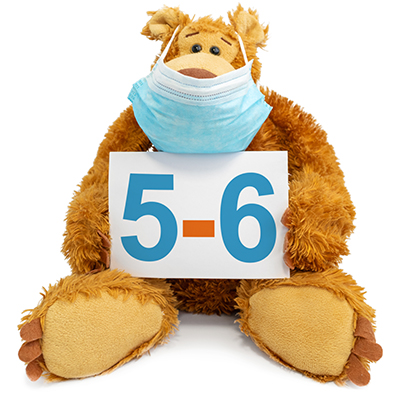Blog
What Are the Potential Signs of Cerebral Palsy in 5-6-Month-Olds?

Cerebral palsy (CP) happens when brain damage affects an individual’s ability to control muscle movements adequately. Several conditions can result in this type of brain injury, including lack of oxygen, maternal infection, head injury, bleeding in the brain and problems with blood supply getting to the brain before birth.
While some families may receive a CP diagnosis shortly after their baby is born, many can go for months or years without receiving one. This diagnosis is essential for obtaining timely physical, occupational, and speech-language therapies, along with other treatments as soon as possible. Understanding what typical developmental milestones are for this age can help parents and caregivers approach doctors with their concerns and get their child the interventions they need.
Normal Stages of Development for 5-6-Month-Olds
Babies are increasingly fun during these months and starting to develop their own personalities. They’re busy socializing with parents, siblings, caregivers, and anyone else that may catch their eye. Typical developmental milestones they should be meeting around this time frame include:
- Sitting while assisted, and possibly unassisted, with good head control
- Attempting to hold or help hold their bottle during feeding times
- Babbling, or first starting to string vowel sounds together, followed by some consonant sounds
- Bringing anything within arm’s length to their mouth
- Giggling and laughing
- Passing toys and other objects between their hands
- Playing with their feet and toes
- Rolling over in both directions
Remember that milestones are simply guidelines for a child’s development. There is no definite rule for when a child may reach a particular milestone or group of milestones, and there’s a broad range of what’s considered normal when talking about developmental milestones. All babies are one of a kind and on their own schedule.
However, if your child is not meeting their developmental milestones in the wide range that doctors follow for their age, this could be a warning sign of cerebral palsy. Don’t hesitate to speak with your child’s pediatrician about any concerns you may have. Early intervention and diagnosis mean your child can start treatments, interventions, and therapies that may help prevent some CP symptoms from getting worse.
Potential Signs of Cerebral Palsy in 5-6-Month-Olds
A child may have developmental delays if they:
- Continue to exhibit poor head control when picked up
- Consistently reach out with only one hand while keeping the other in a fist
- Struggle with eating and drinking
- Do not roll over in either direction without assistance
- Are not able to push up with their hands when lying on their stomach
Cerebral palsy in a 5-month-old or 6-month-old may show one or many of these developmental delays. It’s important to know that your child may meet these milestones and struggle with their developmental milestones as they get older. In most cases, CP is officially diagnosed when a child is older than 6 months, so it’s essential to continue to monitor your child for any signs of delay.
In general, you may want to consider speaking to your child’s doctor if your baby doesn’t exhibit some of the “normal” attributes you’d expect for their age. It’s never a bad idea to address concerns so you can make sure your child is getting the care they need. Speak to your child’s pediatrician if s/he isn’t laughing or squealing, doesn’t smile socially or otherwise express happiness or affection, doesn’t make vowel sounds, doesn’t respond to sounds around him or try to reach for things and doesn’t roll over in either direction without assistance.
An Important Note about Developmental Milestones
Developmental milestones are only guidelines. No two babies are alike, and no two develop the same, though most reach certain milestones at similar ages. Every child develops at their own rate. If your child was born prematurely, you might need to look at the guidelines a little differently. Your baby’s physician will evaluate their development at each well-baby visit but be sure to express any concerns you have about your child during that time.
Up to 80% of all disabilities are detected first by a concerned parent who explains what they’re seeing to their child’s doctor. While it may be normal for pediatricians to advise you to watch for continuing delays, be mindful of your “gut” feeling. If you believe your child may have cerebral palsy or that something went wrong at the time of your delivery, get a second opinion on your child’s medical records as they often hold answers to questions surrounding your child’s birth.
Depending on how your child presents, their pediatrician may recommend a developmental screening to see if they are truly experiencing a developmental delay. The screening is a quick, general measure of your child’s skills and development. It’s not detailed enough to make a diagnosis, but it will show whether a child should be referred for a more in-depth developmental evaluation.
Cerebral palsy is never an easy diagnosis to hear, and it can take an emotional toll on any family. The financial toll is very real too. If you think it’s possible that your child’s cerebral palsy is the result of medical malpractice, contact The Cerebral Palsy Family Lawyers at Janet, Janet & Suggs today so we can look into your case and help you decide if you may be entitled to financial compensation.

Claire Surles, RN
Registered Nurse
Claire comes to JJS after a 10-year career as a labor and delivery nurse. She dedicated her hospital efforts to advocating for families, providing the safest birthing environment possible as Newborn Admission Nurse at UMMC St. Joseph Medical Center in Towson, Maryland. Her passion for helping those who experienced losses at any stage of gestation led to her appointment as Coordinator of the hospital’s ROOTS perinatal loss program. READ FULL BIO
